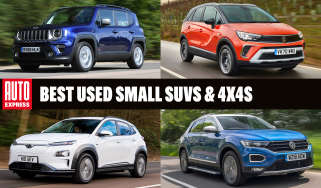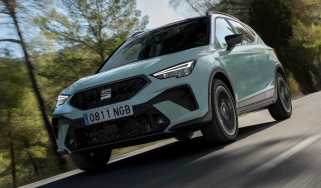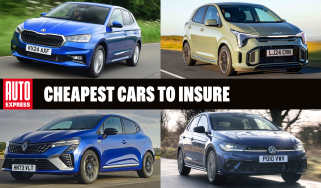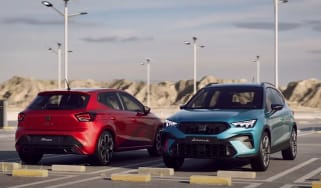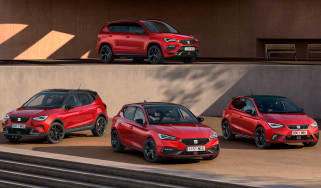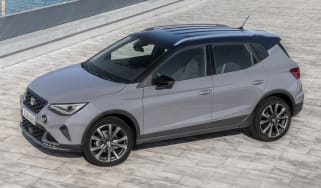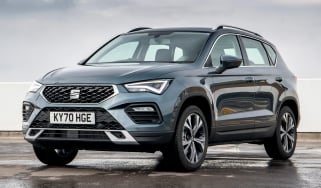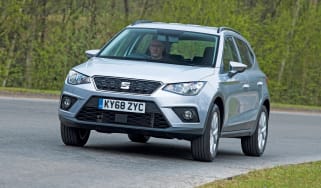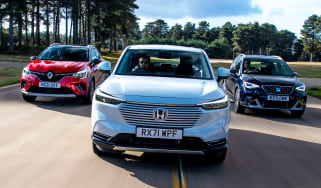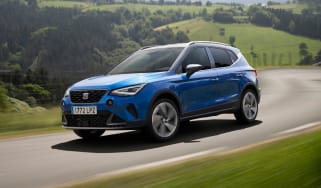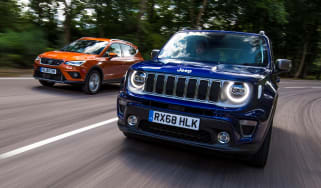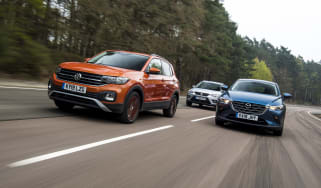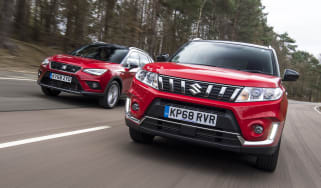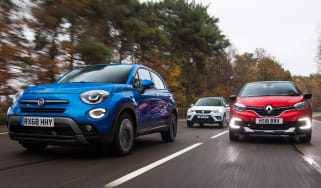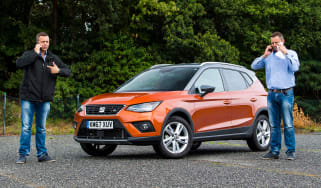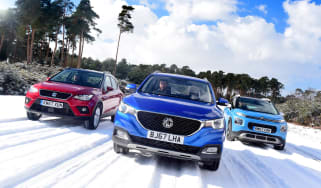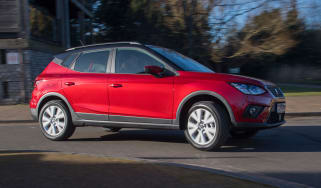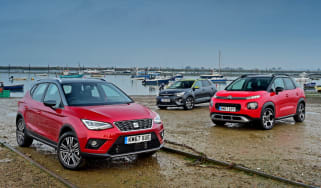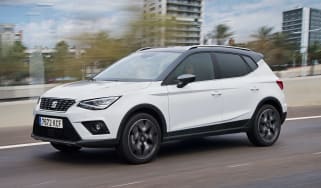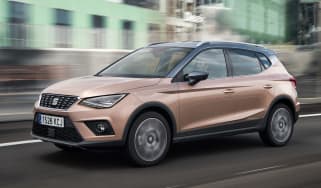SEAT Arona review
The SEAT Arona is a fine small SUV choice, with refined engines and generous standard equipment

The SEAT Arona is one of the more compelling offerings among a vast array of small SUVs currently on the market. It offers a composed and refined drive – albeit one short on pure thrills or involvement. It’s pitched above the Ibiza, which means all versions receive a generous amount of standard equipment.
It’s not the most practical car in the class, but overall, the improvements in styling and tech mean the Arona just about fits the brief as a small family car. It gives drivers the elevated driving position that makes small SUVs like this so appealing, while the engine range delivers a good mix of performance and economy.
About the SEAT Arona
The SEAT Arona went on sale in 2017, and is the smallest SUV in the Spanish car maker's range. It slots below the Ateca compact model and Tarraco seven-seater, and features the same sharp styling cues used across the SEAT range.
Under the skin, the Arona is based on the same running gear as the Ibiza supermini, and offers a bit more space thanks to its more upright body. Its diminutive dimensions make it a rival for cars such as the Citroen C3 Aircross, Hyundai Kona, Kia Stonic, Vauxhall Crossland, Peugeot 2008, Renault Captur and Nissan Juke.
Used - available now

2024 Seat
Arona
24,220 milesAutomaticPetrol1.0L
Cash £16,746
2021 Seat
Arona
37,700 milesManualPetrol1.0L
Cash £9,913
2026 Seat
Arona
48,876 milesManualPetrol1.0L
Cash £10,897
2021 Seat
Arona
26,548 milesAutomaticPetrol1.0L
Cash £13,895Power for the Arona comes from a 1.0 TSI petrol engine in either 94bhp or 108bhp form, or a 1.5 TSI petrol unit producing 148bhp. The lower-powered 1.0 TSI version has a five-speed manual gearbox as standard, while the 108bhp variant has either a six-speed manual or seven-speed DSG twin-clutch gearbox. The 1.5 TSI is only available with the seven-speed DSG transmission. All cars are front-wheel drive – there's no option of the 4Drive 4x4 system found on the larger Ateca, and no special traction control as used on the C3 Aircross or 2008.
SEAT offers a range of trims, kicking off with SE, then SE Technology, FR, FR Sport, Xperience and Xperience Lux.
All cars are well equipped, with roof rails, LED daytime running lights, cruise control, air con, Bluetooth and alloy wheels included even on the entry-level SE model. We'd recommend upgrading to SE Technology because this includes rear parking sensors and the Connectivity Pack that adds sat-nav and wireless phone charging.
There's plenty of personalisation on offer across the range, while FR Sport and Xperiece Lux cars get a sharper look and bigger wheels. Like most small SUV rivals, the Arona isn't the sportiest car to drive, but it's better than most, while the energetic engines mean all cars feel responsive.
Overall, the Arona delivers more space than an Ibiza, while the looks are funky enough to stand out without compromising the car's practicality. Prices for the range start at around £22,500, climbing to just over £29,000 for the top-spec Xperience Lux.
Engines, performance and drive
There aren't many small SUVs that offer a particularly thrilling experience behind the wheel (the Ford Puma being a possible exception), but the SEAT Arona manages to sit near the top of the class anyway. Not because it involves you when you’re driving down a twisty country road (it doesn’t), but because it manages the basics pretty well, like keeping body lean well in check, providing lots of grip, and having strong brakes.
The 108bhp version of the 1.0 three-cylinder petrol engine has a nice spread of power and torque, while the slick six-speed manual gearbox means you can keep the engine on the boil – enough to maintain something approaching brisk progress when needed.
Once you are up to a decent speed, you’ll hear a distant thrum that’s audible enough to remind you that your car has a three-cylinder engine, not a refined four-pot. However, the biggest noise at a motorway cruise will likely be wind noise from around the door mirrors. There is a bit of three-cylinder vibration through your feet, though, primarily via the clutch pedal.
The well-weighted and precise steering, combined with a taut chassis that keeps body control tight, all help make the Arona among the best in the class to drive.
The ride is on the firm side, but the suspension is nicely damped, and still manages to smother rougher surfaces adeptly, even when the car is fitted with 17-inch wheels. One word of caution: FR Sport and Xperience Lux have larger 18-inch wheels that can – in our experience – give a harsher ride, with ridges in the road, and even motorway expansion joints causing an abrupt vertical motion in the cabin. We’d urge you to try both wheel sizes before deciding to buy. Either way, it’ll still provide a more settled ride than the Nissan Juke, which never feels settled and suffers from constant movement – particularly when driving on the motorway – that becomes tiring on long journeys.
We’ve also tried the 1.0 TSI with the DSG dual-clutch seven-speed automatic transmission. It’s not totally foolproof, tending to be a little hesitant and jerky around town, but it shifts quickly enough once up to speed.
Engines, 0-60 acceleration and top speed
The entry-level 1.0-litre version, with 94bhp and 175Nm of torque, requires 11.5 seconds to reach 62mph from a standstill. It should be fine if you mostly stick to urban driving, but you’ll need to work it hard beyond the city limits. Plus, it’ll be revving higher at motorway speeds with its five-speed gearbox compared with the six-speed gearbox of the more powerful 1.0-litre model.
Moving up to that more potent 108bhp 1.0-litre variant sees the acceleration time improve to 10.6 seconds, with only a couple of tenths between the six-speed manual and DSG auto. The 1.5 TSI engine produces 148bhp with a decent 250Nm of torque, resulting in a 0-62mph time of 8.2 seconds and a 130mph maximum. It’s a smooth and punchy performer, but it does cost more to buy compared with the already excellent 1.0-litre petrol, so you’ll need to be sure you need the extra performance before committing to the additional costs.
MPG, CO2 and running costs
The SEAT Arona doesn't feature any fuel-saving hybrid technology to help reduce fuel usage and lower emissions. All engines use a stop-start system to prevent fuel from being wasted while idling, but that’s par for the course these days. The only bit of clever fuel-saving tech the Arona has is on the 1.5-litre petrol, which includes cylinder deactivation technology to cut consumption at a cruise, so it isn’t much thirstier than the smaller 1.0-litre engines.
SEAT claims the 1.0-litre 94bhp version should average up to 51.4mpg on the combined cycle, while the 108bhp variant returns 53.3mpg in six-speed manual form and 47.9mpg when paired with the seven-speed DSG auto gearbox. Despite a sizable power increase, the 148bhp 1.5 TSI still manages 49.6mpg. CO2 emissions range from 121g/km to 137g/km.
That’s competitive with rivals like the Peugeot 2008, but there are hybrid alternatives, such as the Hyundai Kona and Toyota Yaris Cross, which offer significantly better fuel efficiency. Company car drivers would do well to consider those rivals because of their lower emissions, reducing your Benefit-in-Kind (BIK) rates. If your company car scheme allows it, you could go even further and consider the ultra-low emission Renault Captur E-Tech plug-in hybrid, or go for a fully-electric alternative, such as the Hyundai Kona Electric, Peugeot E-2008, and Vauxhall Mokka Electric, all of which could save you even more money.
Insurance groups
Every 1.0-litre Arona sits between groups 9 and 12, and is on a par with its rivals from Citroen and Hyundai.
A Nissan Juke will cost you more; the standard petrol model range occupies groups 12 and 13 (out of 50), while the hybrid is a little higher, in groups 14 and 15.
The more powerful 1.5-litre Arona jumps to group 18, making it the priciest to insure in the range. That’s still less than a hybrid-powered Hyundai Kona, though.
Check if your car needs an MoT and view its complete history with our MoT History Checker...
Depreciation
Our experts predict that the Arona will retain between 43-46 per cent of its value after three years and 36,000 miles of ownership. That’s a little low compared with rivals like the Nissan Juke and Skoda Kamiq, which both manage to maintain over 50 per cent over the same period.
Then there’s the broadly similar Volkswagen T-Cross. In 1.0 110 Move trim, it’ll hold onto 61% over the same period, so there’s a bit of a gulf to consider.
To get an accurate valuation on a specific model check out our free car valuation tool...
Interior, design and technology
SEAT is hoping that the Arona will attract buyers from not only the supermini class, but also from those who fancy a slightly higher driving position and a style-focused approach over a run-of-the-mill family hatchback. As such, the Arona gets plenty of equipment as standard and a few key design features often included only on the options list.
Every car sold in the UK comes with metallic paint included, as well as the option of a contrasting colour on the roof. There are nine body colours and three hues for the roof, allowing for easy personalisation. Oddly, every Arona also gets an ‘X’ motif on the rearmost roof pillar behind the rear door. It makes sense on Xperience or Xperience Lux editions, but is a bit more confusing on other versions.
The facelifted Arona now includes front fog lamps (on FR trim and above) positioned high next to the new grille and daytime running lights. At the rear, there’s a spoiler, faux-diffuser and an Arona badge that looks hand-written. Inside, the level of perceived quality has improved with soft-touch materials across the dashboard, although newer rivals such as the Renault Captur have plusher materials used in more areas, such as the padded armrests on the rear door cards for those in the back. As part of the revisions, a leather-trimmed steering wheel is standard, while FR models and above have LED lighting around the outer air vents on the dash.
Most Aronas come with 17-inch alloy wheels as standard, although there are different designs to help you distinguish between SE, FR and Xperience trims. FR Sport and Xperience Lux variants get larger 18-inch wheels.
The range has its limits, though. You get rather plain cloth covering on the seating in SE and SE Technology editions, while FR and FR Sport have more sculptured seats featuring red flashes for a sportier look. But even the luxury spec, Xperience, doesn’t go to the lengths of full leather upholstery; there’s just a bit of contrast stitching and a slightly more complex fabric pattern. At least FR Sport and Xperience Lux have a grippy Alcantara-style material on their seats.
Sat-nav, stereo and infotainment
All Arona versions, except the SE, include a 9.2-inch touchscreen. The tablet-style display is now positioned higher up on the dash, and is easier to use on the move.
The infotainment display is sharp, with clear graphics and smartphone app-style buttons at the bottom of the screen. Android Auto and wireless Apple CarPlay are standard across the range, while wireless phone charging is standard from SE Technology and above.
All Aronas come with a digital instrument cluster. It’s a basic eight-inch display across the range, while FR Sport and Xperience Lux come with a larger 10.25-inch display that’s fully configurable, much like Audi’s virtual cockpit.
The standard six-speaker sound system provides reasonably clear sound quality, but audiophiles must look towards the Ford Puma, Hyundai Kona, Nissan Juke or Volkswagen T-Roc if they want an upgradable sound system.
Practicality, comfort and boot space
On the face of it, there’s not too much to complain about with the Arona’s packaging and practicality. There’s plenty of room up front for two adults, of course, and you’re unlikely to get too many complaints about headroom or shoulder room if you ask a couple more to jump into the back seats.
The SEAT has a reasonably sized boot compared with its closest rivals. There’s enough space for most of a small family’s needs. However, other baby SUVs provide greater luggage space these days.
Dimensions and size
The Arona typifies how tightly knit car manufacturers’ ranges are these days. It’s 4,138mm long, 1,780mm wide (including mirrors), and 1,543mm tall – which makes it longer than a SEAT Ibiza and considerably taller than a SEAT Leon.
However, the car’s wheelbase – always a good guide to how much interior space there will be – is 2,566mm. That’s only a couple of millimetres more than a five-door Ibiza’s, showing that, despite the increase in length, there’s not that much extra knee- or legroom over the Arona’s supermini cousin.
Leg room, head room & passenger space
Rear headroom is reasonably generous in the back of an Arona, but passengers may complain about leg- and knee room. Rivals such as the Skoda Kamiq (which uses the same platform as the Arona, albeit with a longer wheelbase) offer greater space for a six-foot adult in the back, while other small SUVs like the Citroen C3 Aircross and Renault Captur have an innovative sliding rear seat, which trades some boot space for rear passenger accommodation.
Two Isofix points are provided on the outer rear seating positions.
Boot Space
Every Arona comes with an adjustable height boot floor as standard across the range, allowing you to prioritise either outright space or a flat loading area with the rear seats folded down. The boot aperture is reasonably wide for such a compact vehicle. There are a couple of hooks at the sides of the boot for shopping bags, while Xperience models and above with the Storage Pack have four tie-down points to lash items to.
The Arona has an overall boot capacity of 400 litres, rising to 823 litres if you lower both parts of the 60/40 split rear seat. That’s more than the likes of the Honda HR-V and Captur (with its seats rear seats pushed all the way back), but it is smaller than Ford Puma, Hyundai Kona, and Nissan Juke.
Towing
Both the 109bhp 1.0-litre and 148bhp 1.5-litre petrol models have a maximum braked trailer weight of 1,200kg, which is 50kg shy of the 1.0-litre Juke.
For maximum towing capacity in a small SUV, look at the four-wheel drive ‘4Motion’ VW T-Roc, because that can tow up to 1700kg in both 2.0-litre petrol and diesel forms.
Reliability and safety
Like all modern-day SEATs – and their VW Group counterparts – every Arona should fit the bill as safe family transport. The Arona was awarded a full five-star Euro NCAP rating when it was retested in 2022. It did better than the four-star results of the Honda HR-V and Vauxhall Mokka, but the five-star Toyota Yaris Cross tested under the same regime scored higher than the Arona across the board.
Every Arona gets tyre pressure monitoring, autonomous emergency braking (AEB), front and rear seat belt reminders, six airbags, Isofix child seat mounts and tiredness recognition. You’ll have to step up to Xperience trim to gain adaptive cruise control and the Xperience Lux for a Park Assist system and a rearview camera. It is a shame that blind spot monitoring isn’t standard like on the Volkswagen T-Cross, because it’s a helpful feature that’ll warn you of cars alongside you on the motorway.
SEAT had a disappointing result in the 2023 Driver Power survey, with the manufacturer coming in 23rd place out of 32 brands, while the Arona itself placed 59th out of 75 cars in the owner satisfaction poll. That puts it behind the Kia Stonic and Hyundai Kona, but ahead of the current Mokka.
It is mildly annoying that the entry-level SE and SE Technology models don’t come with an alarm as standard, meaning you’ll either need to pay around £200 to get one fitted as an option, or upgrade to FR trim and above.
Warranty
The SEAT Arona comes with an industry-standard three-year/60,000-mile warranty. While that doesn’t set any records, it’s on par with rivals from the rest of the VW Group (Skoda and Volkswagen included), as well as those wearing a Citroen or Peugeot badge.
Hyundai’s five-year, unlimited-mileage setup is good for those covering substantial distances, while Kia offers one of the longest guarantees in this segment, with its seven-year/100,000-mile warranty. Then there is the Toyota Yaris Cross, which can be covered for up to 10 years or 100,000 miles – although you will have to keep getting your car serviced annually at a Toyota main dealer to maintain the warranty over that extended period.
Servicing
SEAT offers a service plan at the point of sale, which covers the first two services. It costs just under £500 if you’re paying outright, or around £20 per month over 24 months. Included in the plan is a two-year warranty on all parts, a video report, a wash and vacuum, drop off and collection, and (if available at the dealer) a courtesy car.

